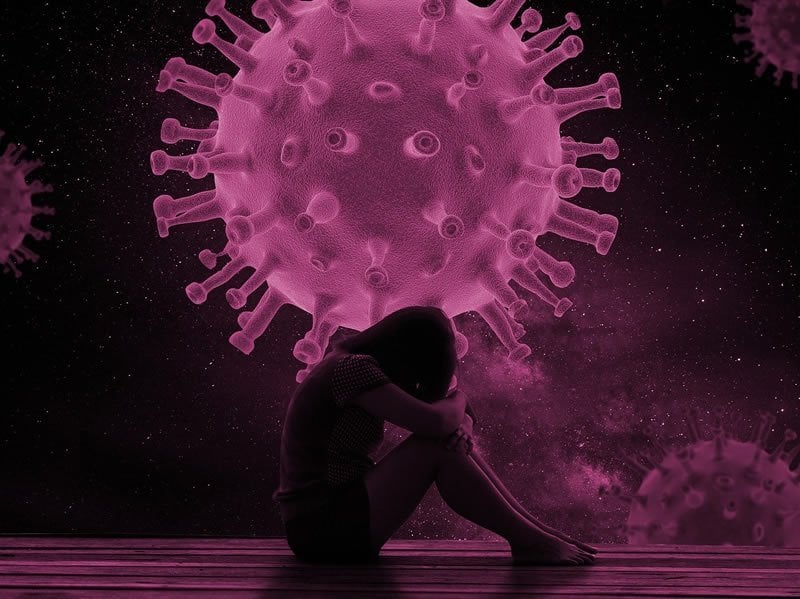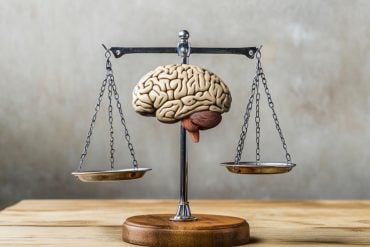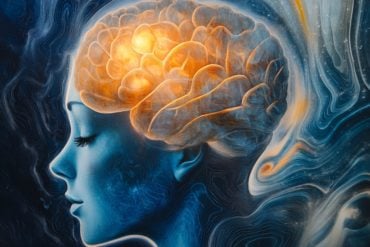Summary: Reviewing data from past pandemics, researchers suggest some of those exposed to COVID-19 could have an increased risk of developing neurological and mental health disorders in the long term. Acute viral infections can result in encephalopathy, psychosis, depression, demyelination disorders, and problems with neuromuscular function.
Source: UCSD
In an article posted online April 13, 2020 in the journal Brain, Behavior, and Immunity, a trio of researchers at University of California San Diego School of Medicine suggest that in the aftermath of the novel coronavirus pandemic, a host of neuropsychiatric challenges may remain — or emerge — for those recovering from COVID-19 infections.
“Past pandemics have demonstrated that diverse types of neuropsychiatric symptoms, such as encephalopathy, mood changes, psychosis, neuromuscular dysfunction or demyelinating processes, may accompany acute viral infection, or may follow infection by weeks, months, or longer in recovered patients,” the authors warn.
“Our article seeks to bring the medical community’s attention to the need for monitoring and investigations to mitigate such outcomes, not to cause panic among individuals whose lives are already greatly affected by this pandemic.”
Encephalopathy is a broad term for any insult that alters brain function or structure, and therefore one’s mental status. Demyelination is loss of the protective myelin sheathing of nerve cells, resulting in neurological problems.
“COVID-19 is a significant psychological stressor, both for individuals and communities,” said senior author Suzi Hong, PhD, associate professor in the departments of Psychiatry and Family Medicine and Public Health at UC San Diego School of Medicine.
“There are fears of illness, death and uncertainty of the future. This pandemic is a potential source of direct and vicarious traumatization for everyone.”
But less attention, wrote Hong and co-authors Emily Troyer, MD, and Jordan Kohn, PhD, has been focused on the impact the virus itself may have on the human central nervous system (CNS) and related neuropsychiatric outcomes. The authors noted that studies of past respiratory viral pandemics indicate diverse types of neuropsychiatric symptoms can arise, including increased incidence of insomnia, anxiety, depression, mania, suicidality, and delirium, which followed influenza pandemics in the 18th and 19th centuries.

“Encephalitis lethargica is an inflammatory disorder of the CNS marked by hypersomnolence (abnormal sleepiness), psychosis, catatonia, and Parkinsonism. Incidence increased around the time of the 1918 pandemic,” said the authors.
During more recent viral outbreaks, such as SARS-CoV-1 in 2003, H1N1 in 2009, and MERS-CoV in 2012, there were subsequent reports of higher rates of narcolepsy, seizures, encephalitis (brain inflammation), Guillain-Barre syndrome and other neuromuscular and demyelinating conditions.
“Reports are already surfacing of acute CNS-associated symptoms in individuals affected by COVID-19,” said Hong, including greater stroke incidence in severely infected patients in Wuhan, China, along with delirium and loss of smell and taste senses. (A survey of UC San Diego Health patients treated for COVID-19, published April 12, 2020 issue of International Forum of Allergy & Rhinology, described the first empirical findings strongly associating sensory loss with COVID-19. The loss was temporary, said the authors, with taste and smell returning within two to four weeks of infection.)
Hong, Troyer and Kohn say the neuropsychiatric consequences of the current novel coronavirus pandemic are not yet known, but likely will be significant and last for years. They said emerging evidence suggests the biomedical community should begin monitoring for symptoms of neuropsychiatric conditions and the neuroimmune status of persons exposed to SARS-CoV-2, the virus that causes COVID-19.
“We will need to do this at different points in their lives, for years to come, to fully appreciate this pandemic’s effects on neuropsychiatric outcomes for differing age groups, and how to better prepare for pandemics to come,” Hong said.
About this coronavirus research article
Source:
UCSD
Media Contacts:
Scott LaFee – UCSD
Image Source:
The image is in the public domain.
Original Research: Open access
“Are we facing a crashing wave of neuropsychiatric sequelae of COVID-19? Neuropsychiatric symptoms and potential immunologic mechanisms”. by Emily A. Troyer, Jordan N. Kohn, Suzi Hong.
Brain, Behavior, and Immunity doi:10.1016/j.bbi.2020.04.027.
Abstract
Are we facing a crashing wave of neuropsychiatric sequelae of COVID-19? Neuropsychiatric symptoms and potential immunologic mechanisms
The coronavirus disease 19 (COVID-19) pandemic is a significant psychological stressor in addition to its tremendous impact on every facet of individuals’ lives and organizations in virtually all social and economic sectors worldwide. Fear of illness and uncertainty about the future precipitate anxiety- and stress-related disorders, and several groups have rightfully called for the creation and dissemination of robust mental health screening and treatment programs for the general public and front-line healthcare workers. However, in addition to pandemic-associated psychological distress, the direct effects of the virus itself (several acute respiratory syndrome coronavirus; SARS-CoV-2), and the subsequent host immunologic response, on the human central nervous system (CNS) and related outcomes are unknown. We discuss currently available evidence of COVID-19 related neuropsychiatric sequelae while drawing parallels to past viral pandemic-related outcomes. Past pandemics have demonstrated that diverse types of neuropsychiatric symptoms, such as encephalopathy, mood changes, psychosis, neuromuscular dysfunction, or demyelinating processes, may accompany acute viral infection, or may follow infection by weeks, months, or longer in recovered patients. The potential mechanisms are also discussed, including viral and immunological underpinnings. Therefore, prospective neuropsychiatric monitoring of individuals exposed to SARS-CoV-2 at various points in the life course, as well as their neuroimmune status, are needed to fully understand the long-term impact of COVID-19, and to establish a framework for integrating psychoneuroimmunology into epidemiologic studies of pandemics.
Feel Free To Share This COVID-19 News.






